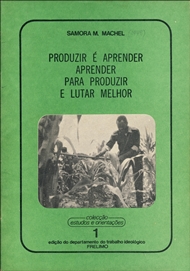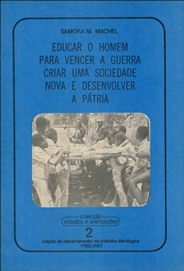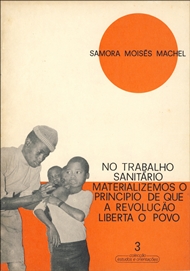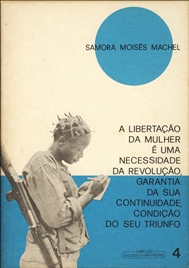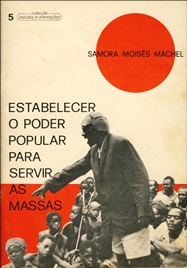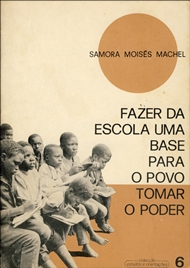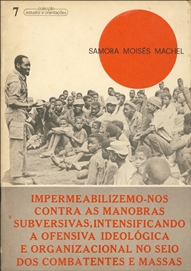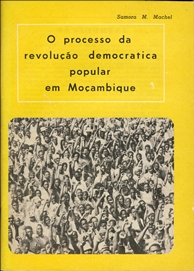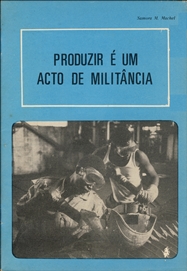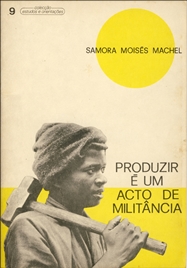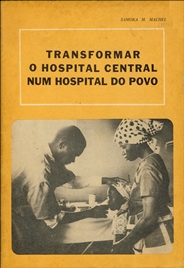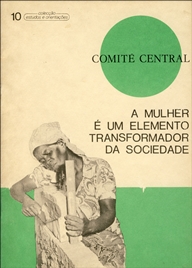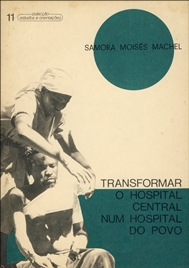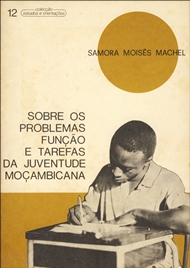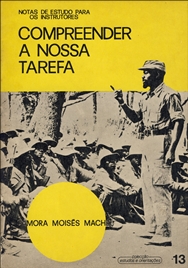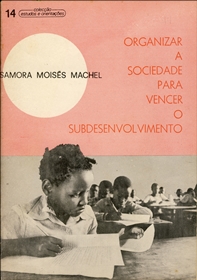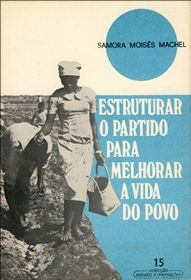Colecção «Estudos e
Orientações», 1978-1983
![]()
A colecção de textos «Estudos e Orientações» - quase todos de Samora Machel - foi originalmente publicada durante a luta armada pela libertação nacional, sendo posteriormente reeditada e ampliada após a independência pelo Departamento de Informação e Propaganda (DIP) e também, entre Outubro de 1978 e Abril de 1983, pelo Departamento de Trabalho Ideológico (DTI), como uma série de panfletos em sequência numerada. Alguns dos últimos números da série são textos do período pós-independência (veja abaixo).
As variações na numeração e as repetições descritas abaixo parecem ter sido uma consequência de uma falta de coordenação entre os dois departamentos: alguns títulos apareceram em momentos diferentes com números diferentes, e o mesmo número foi às vezes atribuído a mais de um texto. Projectos de capa também variados. Vários desses documentos, que não parecem ter sido apenas "discursos", também apareceram repetidamente em colecções e foram traduzidos para o inglês e outras línguas. O prefácio da primeira das edições do DTI explica, do ponto de vista da Frelimo, por que os textos estavam sendo republicados. Isto foi escrito no final do exercício de "reestruturação do Partido" entre Fevereiro e Novembro de 1978, na sequência do III Congresso que declarou oficialmente a Frelimo como um partido de vanguarda marxista-leninista:
"Durante a luta armada de libertação nacional, a Frelimo editou uma importante colecção de textos da autoria do Presidente Samora Moisés Machel, intitulada «Estudos e Orientações». Esta designação diz muito sobre o conteúdo e objectivos dos documentos nela incluída. De forma clara e acessível, eles analisam aprofundadamente todos os principais aspectos e situações que o desenvolvimento da nossa luta determinava nas suas frentes militar, política, económica, social e cultural. No seu conjunto, esses textos sintetizam os princípios fundamentais da ideologia política da Frelimo. Na fase actual da nossa Revolução, o conhecimento e estudo desses textos é indispensável para a construção da base ideológica necessária à construção da sociedade socialista, porque é através deles que melhor podemos compreender a realidade para a transformar (Produzir é Aprender, Aprender para Produzir e Lutar Melhor, p.3)."
![]()
The «Estudos e Orientações» collection of texts - almost all by Samora Machel - was originally published during the armed struggle for national liberation, and was subsequently re-issued and extended after independence by the Departamento de Informação e Propaganda (DIP) and also, between October 1978 and April 1983, by the Departamento de Trabalho Ideológico (DTI), as a series of pamphlets in a numbered sequence. Some of the later numbers in the series are texts from the post-independence period (see below).
The variations in numbering and the repetitions noted below seem to have been a consequence of a lack of coordination between the two departments: some titles appeared at different times with different numbers, and the same number was sometimes assigned to more than one text. Cover designs also varied. Several of these documents, which do not seem to have been merely "speeches", have also appeared repeatedly in collections and have been translated into English and other languages. See Amélia Souto and António Sopa’s authoritative Samora Machel: bibliografia 1970-1986 (Maputo: CEA/UEM, 1996) for full references to this material. The preface to the first of the DTI re-issues explains, from Frelimo’s point of view, why the texts were being re-published. This was written towards the end of the “restructuring of the Party” exercise between February and November 1978, in the aftermath of the III Congress which had officially declared Frelimo to be a Marxist-Leninist vanguard party:
Durante a luta armada de libertação nacional, a Frelimo editou uma importante colecção de textos da autoria do Presidente Samora Moisés Machel, intitulada «Estudos e Orientações». Esta designação diz muito sobre o conteúdo e objectivos dos documentos nela incluídos. De forma clara e acessível, eles analisam aprofundadamente todos os principais aspectos e situações que o desenvolvimento da nossa luta determinava nas suas frentes militar, política, económica, social e cultural. No seu conjunto, esses textos sintetizam os princípios fundamentais da ideologia política da Frelimo. Na fase actual da nossa Revolução, o conhecimento e estudo desses textos é indispensável para a construção da base ideológica necessária à construção da sociedade socialista, porque é através deles que melhor podemos compreender a realidade para a transformar (Produzir é Aprender, Aprender para Produzir e Lutar Melhor, p.3).
An interesting article by Celestino Jorge, “Como nasceu ‘Fazer da escola uma base para o povo tomar o poder’,”published in Tempo no.431 (14 August 1988), p.21-22, gives us some insight into the origins and status of at least one of these texts. Jorge was a student in Bagamoyo in early 1973 (just after the assassination of Amílcar Cabral in January) when Joaquim Chissano, then based in Dar es Salaam as the FRELIMO representative, called a meeting to address student discontents and low morale – which Jorge summarises as being the result of “autoritarismo, arbitrariedade nas decisões, que se evidenciava em punições severas descaradamente injustificadas." As a consequence of the way Chissano handled the meeting, allowing everybody to speak, Jorge writes “aprendemos o ABC da governação da vida colectiva.” Later, in July 1974, another meeting was called by Chissano, who read out the entire text of Fazer da escola uma base para o povo tomar o poder (no.6 below), pausing from time to time to emphasise or explain a particular point. According to Jorge, this process made a deep impression:
Vimos como éramos tão bem retratados, como tão bem era descrita a nossa situação, que outra coisa não havia a fazer senão identificarmo-nos com a síntese, a teoria sobre como deve ser a Escola Nova, feita para a libertação do Homem moçambicano.
Click here to view or download a PDF file of the Celestino Jorge article.
MHN Resources
(in number order)
Above: On the left, Produzir é aprender, aprender para produzir e lutar melhor (Maputo: DTI, 1978), 23 pages. This text was first published in October 1971. In the centre, Educar o homem para vencer a guerra, criar uma sociedade nova e desenvolver a pátria (Maputo: DTI, 1978), 22 pages. The text of a message to the 2nd Conference of FRELIMO's Departamento de Educação e Cultura in September 1970, first published by the DTI in November 1973. On the right, No trabalho sanitário materializemos o princípio de que a revolução liberta o povo (Maputo: DTI, 1979), 25 pages. The text of a speech by Samora Machel at the beginning of a FRELIMO nursing course held in December 1971, and first published in December 1973. Click on the cover images to view or download the texts of the pamphlets.
Above: On the left, A libertação da mulher é uma necessidade da revolução, garantia da sua continuidade, condição do seu triunfo (Maputo: DTI, 1979), 38 pages. This text was the “document de base” at the first Conferência Nacional da Mulher Moçambicana, held on 4 March 1973, and was first published by the DTI in January 1974. In the centre, Estabelecer o poder popular para server as massas (Maputo: DTI, 1979), 60 pages. This text was produced in November 1971, during the reorganisation of one of FRELIMO’s educational centres, and first published in 1974. On the right, Fazer da escola uma base para o povo tomar o poder (Maputo: DTI, 1979), 31 pages. This text is the one mentioned above, produced during a crisis in Bagamoyo and first published in July 1974. Click on the cover images to view or download the texts of the pamphlets.
Above: On the left, Impermeabilizemo-nos contra as manobras subversivas, intensificando a ofensiva ideológica e organizacional no seio dos combatentes e massas (Maputo: DTI, 1979), 24 pages, no.7 in the series. The text was written in 1973 in response to an ideological campaign of subversion launched by the Portuguese after the military failure of «Operação Nó Górdio» in 1970. In the centre, the major text O processo da revolução democrática popular em Moçambique (Maputo: DTI, s.d.), 68 pages, no.8 in the series. The text, described as a synthesis of multiple speeches and discussions with the broad masses, FRELIMO fighters, and the party leadership, was also published in Russian as “Развитие народно-демократической революции в Мозамбике (февраль 1974 г.)” in the collection Борьба за освобождение портулгальских колоний в Африке (1961-1973) (Москва: Издат. Наука, 1975), pages 35-68. On the right, also confusingly labelled no.8 in the series, Produzir é um acto de militância (Maputo: Edições da Frelimo [DIP], s.d.), 32 pages. This text is described as orientations given to workers in industrial enterprises on 13 October 1976, and was also published in Notícias, 14 October 1976 and in Tempo no.316 (24 October 1976). Click on the cover images to view or download the texts of the pamphlets.
Above: On the left, another edition of Produzir é um acto de militância (Maputo: DTI, 1979), 36 pages, 20,000 copies printed, no.9 in the series. It includes a different preface, and has some minor variants in the text. In the centre, a DIP edition of Transformar o Hospital Central num hospital do povo (Maputo: Edições da Frelimo [DIP], 1976), 30 pages, no.10 in the series. This is the text of a speech by Samora Machel to health workers on 6 October 1976. On the right, also labelled no.10 in the series, A mulher é um elemento transformador da sociedade, 2ª. edição (Maputo: DTI,1980), 17 pages, 20,000 copies printed. This document is not attributed to Samora Machel, but rather to the FRELIMO Central Committee, and was originally produced in 1972. It was also printed in Notícias (24 October 1976), pages 2 and 4. Click on the cover images to view or download the texts of the pamphlets.
Above: On the left, another edition of Transformar o Hospital Central num hospital do povo, 2ª. edição, (Maputo, March 1980), 36 pages, 20,000 copies printed, no.11 in the series - the speech by Samora Machel to health workers on 6 October 1976. In the centre, Sobre os problemas, função e tarefas da juventude moçambicana 2ª. edição (Maputo, March 1980), 20 pages, 20,000 copies printed, no.12 in the series. A speech to 1,000 young people on 15 December 1976, first published as a pamphlet in April 1977. On the right, Compreender a nossa tarefa (Maputo: DTI, May 1979), 20 pages, no.13 in the series. A text written in December 1970 for use by political-military instructors in FRELIMO camps. Click on the cover images to view or download the texts of the pamphlets.
Above: On the left, Organizar a sociedade para vencer o subdesenvolvimento (Maputo, February 1982), 47 pages, 20,000 copies printed, no.14 in the series. There is no explanatory text, introduction or preface but the text marks the beginning of the 1982 school year. On the right, Estruturar o partido para melhorar a vida do povo (Maputo, April 1983), 42 pages, 20,000 copies printed, no.15 and possibly the last in the series. Click on the cover images to view or download the texts of the pamphlets.
![]()



![Aluka: Struggles for Freedom [subscription required] Struggles for Freedom](imgs/aluka_200.png)



